ALICK "SANDY" MUNRO
1923 - 2006
"It's the end of an era", were the words frequently heard in the village following upon the sad news of the death of Sandy Munro. Many people will remember him trundling round the village on his "buggy" following his stroke in 1997. Older residents will know of the immense contribution Sandy made to all aspects of village life over a period of 60 years. He was, above all, a modest man and so not many will know the details of his distinguished war service with the RAF which preceded his arrival at Sulgrave in 1945. The funeral service, in the presence of a packed congregation, was held at the church on Tuesday 12th September 2006. The family have kindly allowed the reproduction on this website of the Tribute given at the service.
First, some photographs:
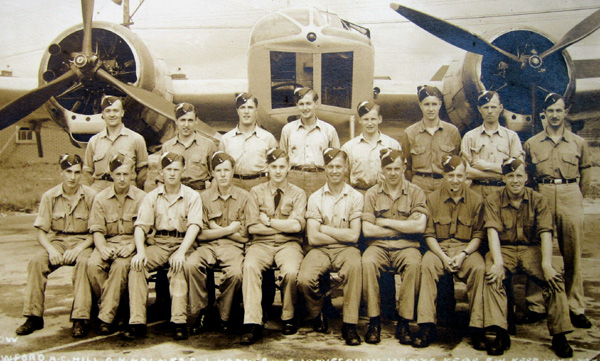
Third from the left, training as RAF aircrew in Canada, 1943
Marriage to Kathleen Seeney, Sulgrave Church, 1945
On far left with shovel, on way to snow clearing duties in Helmdon Road, January 1963
Middle of picture, always with a ready smile for others, Helmdon Road, January 1963
Family man, early 1960s
Always ready to help - caller at Charity Bingo in Church Hall, early 1960s
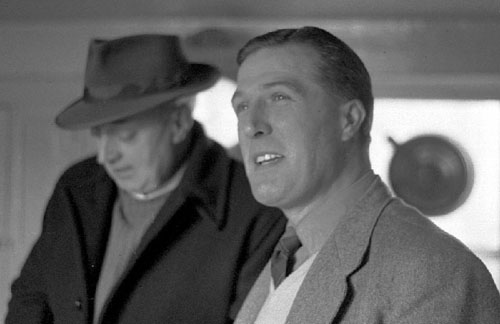
Relaxed chat in the Star, 1960s
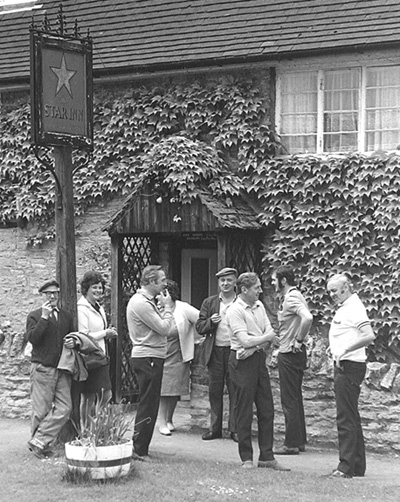
Happy group - wife Kathleen second from left, Sandy third from left, 1970s
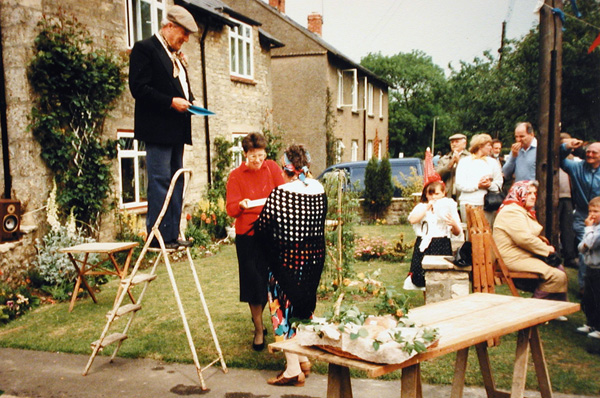
Sandy outside his house in Manor Road - playing a part in the Village Fair
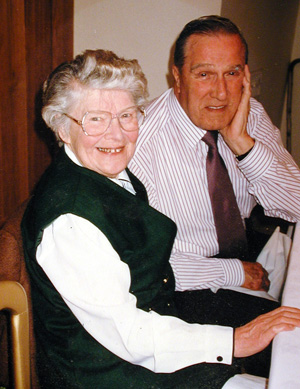
Lunch at Sulgrave Manor 1999
Same cheery smile, with daughter Carol and great-grand-children, May 2001
TRIBUTE GIVEN BY COLIN WOOTTON
AT THE FUNERAL ON 12TH SEPTEMBER 2006
Can I begin by saying how wonderful it is to see you all here today and what a privilege it is to be asked to say a few words about Sandy's long and active life.
He was, in fact, christened Alick Munro - however from the very beginning he was known to all and sundry as "Sandy" and it would be right for me to refer to him as "Sandy" in this tribute.
The clan Munro traditionally hailed from the Scottish highlands to the north of Inverness - an area known as Easter Ross - and indeed the old family home had originally been at Portmahomack between the Moray and Dornoch Firths. However, Sandy's father travelled widely in the course of his business and Sandy was, in fact, born in Glasgow in June 1923. He was the second of three boys and after attending primary school at Alexandra Parade Elementary School he was awarded a scholarship to Allan Glen's High School for Boys. In a fee-paying era, the school was noted for selecting its pupils on the basis of academic ability and its emphasis on science and engineering led to it subsequently becoming Glasgow's High School for Science. It was here that Sandy first exhibited the excellence at mathematics which was to stand him in such good stead during his wartime service and long career as an accountant.
After graduating from the High School, Sandy became a trainee cost accountant with the Anglo-Iranian Oil Company - a good position with excellent career prospects. Then came the war and those working for the company were deemed indispensable to the war effort and so he had what was called a reserved occupation. For many people this was an enviable situation which saved them from service in the armed forces. Sandy could have remained safely with them for the duration of the war but, in what he later called an act of boyish bravado, he volunteered for the Royal Air Force.
Consequently, in 1943 he found himself training for flying operations in Canada. He had wanted to be a pilot but his mathematical background and methodical mind led to his selection as bomb aimer and navigator first in Wellingtons and later in Lancaster bomber aircraft. Those of us from a later generation who fly from place to place by means of global positioning satellites can have little idea of what it can have been like to sit in the isolated turret of a wartime bomber, usually at night, under attack from enemy fighters and anti-aircraft fire, trying to remain calm enough to make precise calculations based on the sketchiest of information - calculations of life and death importance to the crew.
Sandy was one of those who had the courage, character and application to do just that. And yet, like so many of his generation he was not often given to talking about it in later years.
Sandy did many operations with his Canadian pilot, Flying Officer Wilkinson. However, in February 1945 their Lancaster crashed on returning to its Lincolnshire base and Fred Wilkinson was so badly injured that he was not expected to survive. Sandy thought never to see him again but he made a miraculous recovery back home in Canada and the two were re-united here in the village some 45 years later. Sandy joined another crew and made his final bombing raid in April 1945, appropriately to Hitler's mountain retreat at Berchtesgaden in Bavaria. In the midst of all this, Sandy's elder brother, also in the RAF, was reported killed in action.
Whilst stationed at Chipping Warden airfield Sandy, as he recounted to me much later, "had the good fortune to go to a local dance where he asked someone - "excuse me, but who is the extremely pretty girl who has just come in". The pretty girl in question was my cousin Kathleen then living with her parents in what is now known as Wootton House. They were duly introduced and were soon in each other's company as often as Sandy's operational duties allowed. They became engaged and I would like to read to you the following extract from an email received from Sandy's brother, now living in the USA:
"One of my best memories of Kathleen and Sandy was before they were married. They came to visit our home in Scotland in order for Kathleen to meet our parents. During that visit the world heard the news of the allied victory in Japan. I can still see how happy they were as they joined an impromptu dance party in a neighbourhood street. I thought I had never seen anybody as happy as they were that day".
They were married in this church on an extremely cold day in December 1945. My cousin Valerie and I had the honour of being bridesmaid and page boy respectively, shivering in clothes made from died parachute silk. They took up residence in the village and remained here for the rest of their married lives. Kathleen's mother had been the only girl amongst the seven rumbustious sons of my grandfather, the local builder, and she developed the necessary toughness of character to survive that experience. Kathleen inherited the same characteristic from her mother; she tended to hold steadfastly to her views and was constantly active in village affairs. Sandy also became heavily involved in a large number of village activities but often, it seemed, content to act as a consort. This was a relationship which I think he cultivated and which served them admirably throughout their married life.
After the war, Sandy resumed his career as an accountant, firstly with the very small Banbury firm Morris and Harper. Because of his involvement in so many local activities and, above all because of his totally trustworthy and confidential nature, he was able to gain many additional local clients for the company, which was flourishing greatly with twenty staff when he left in 1966. He then formed his own accountancy company and was later with March Engineering at Bicester before finishing his working life as the Company Secretary for Henry Stone Printers of Banbury, from whom he retired in 1988. Sandy was always happy to put his accountancy skills at the disposal of the many village activities in which he or Kathleen were involved: Parish Council, Parochial Church Council, School Managers, Women's Institute, Cricket Club, Football Club, Billiard Club, Gardening Society, even the long defunct Pig Club - many an harassed secretary has known exactly where to turn to get the accounts audited promptly and - of course - free of charge.
For almost 40 years Sandy was accountant to Wootton Brothers, the family building company. However, as a member of the extended family he was so much more than just the accountant. Some of you may remember that there was often a distinct lack of brotherly love between my father and the other two directors and without Sandy's calm voice of reason almost anything might have happened. Blessed - indeed - are the peacemakers.
One of Sandy's many personal interests was music, both listening and performing. He was an accomplished self-taught piano player and his younger brother remembers him playing classical, jazz and some boogie-woogie at home. He also had a fine voice and for many years performed with the Jubilee Singers of Cropredy. He was a Vice-President of Banbury Operatic Society and rarely missed one of their performances.
Like so many of his war-time generation, Sandy was a stalwart of the British Legion, serving his turn as President and never missing a Remembrance Service.
Daughters Carol and Hilary were born in 1946 and 1950 respectively. They grew up in the village, were educated locally, still live locally and with their own children and grand-children were a constant joy and support to their parents, especially to Sandy himself during the last few years since his stroke in 1997.
Together with the bitter blow of Kathleen's death in 1999, the stroke was an event which was bound to change his life dramatically. However, after months of physiotherapy he was able to walk again with a walking stick and he joined the Brackley Dippers' Club, a swimming club for those with varying degrees of disability and with whom he swam every Saturday morning. It goes without saying that he was on the Committee of the Club, attended all its meetings and was its Treasurer.
Many people in the village will remember Sandy best from that time - his little outings on his motorised buggy - immaculately turned out, of course - handsome as ever - same old Sandy - same welcoming smile - same interest in everything about him.
He was, in fact, the kind of man who made your heart lift up just to see him. For everyone, whatever their interests, he was just SO good to be with. When he chose to talk, he was a brilliant raconteur, aided by his slight and lilting Scottish accent. However, I think the most marvellous thing about him was his ability to listen. No matter how boring your story, Sandy could appear to hang on every word, prompting occasionally with his favourite expressions: "Is that a fact then" and "How right you are". Because of this, he was a veritable confidante for many people and one of his business associates has said: "When you couldn't talk to your own dad, Sandy WAS your dad". I can personally vouch for that.
Many people in the village, shocked at the news despite it's inevitability, have said to me: "It's the end of an era". For once, for this village, the over-worked expression rings true. Indeed, for the oldest amongst us, can it ever be the same place again?
However, Sandy would not have wanted us to be here to mourn but rather to celebrate his long, varied and active life. It is wholly appropriate that we should do that in this church where he and Kathleen were married 60 years ago, where their daughters were christened and married, their grandchildren christened and where Sandy himself so often raised his voice in praise and celebration.
Thank you all so much for your patience.